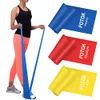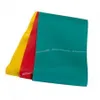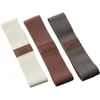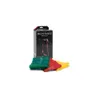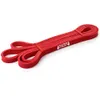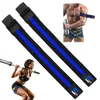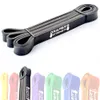
Ditch the planks and sit-ups — who needs them anyway? This abs workout builds stronger core muscles with just six exercises, one resistance band and only 15 minutes out of your day.
That means you can quickly grab one of the best resistance bands, get into it and then return to life without missing a beat. As a trainer, I like regularly trying out other trainers’ workouts to inspire my coaching. I fell upon this abs workout while falling down the YouTube rabbit hole recently, and decided to test it for myself.
This core routine by Anabolic Aliens pumps some energy back into stale resistance band workouts, shows you how to be creative, and torches your core muscles with very little equipment. Just a resistance band, actually.
Watch the resistance band abs workout at home:
Coach Mike says this core workout at home will get you “ripped abs and obliques” and you’ll “build your core muscles with a resistance band.” For those wondering if resistance bands work, they do, but you need to apply the right amount of tension to your working muscle groups to stimulate and overload them.
And building muscle and strength takes time. So you’ll need to progressively overload your muscles consistently, adapting variables over time to keep muscles meeting with challenge as they grow and get stronger. Sometimes, that means getting more creative with the exercises, set, reps, or type of resistance band you use.
Getting “ripped” is a desirable outcome, but remember, buzzwords like “strengthening,” “toning,” or “sculpting” your abs and core only really apply if you’re able to balance factors like biology and genetics, lifestyle, diet and exercise.
A six-pack doesn’t just show up because you’re hitting up your ab workouts regularly. To learn more, here are some reasons you can’t see your abs yet despite working out.
Get instant access to breaking news, the hottest reviews, great deals and helpful tips.
“Grab your resistance bands and get ready for an intense core workout. Those abs and obliques are gonna be on fire!” says Mike. “This routine is performed in a round format meaning you're working exercise to exercise.” Once you finish the exercises, that’s a round. For each move, aim for 15 reps (per side, where needed) and rest 30 seconds between each move.
“You can use this workout as a 1-round finisher at the end of your core day or you can do multiple sets to maximize volume for a full abs and obliques workout,” Mike adds. “If you're doing multiple sets, try 3-4 rounds and rest 1-3 minutes between rounds depending on your experience level.” If you’re unsure, the video has a rep and rest counter so you can follow along.
Exercises:
- High standing crunch
- High downward oblique swing
- Middle Pallof press
- Middle 180 twists
- Low upward oblique swing
- Low deadbug dual knee-ins
Verdict
Yes, you can increase core strength and stability using a resistance band. For beginners, I’d opt for a thinner band that offers less resistance and go thicker as you become more experienced to help progress the exercises. You could also stack resistance bands if you really want to fire up the abs.
What makes this workout effective is the combination of compound exercises, which means you recruit multiple muscle groups along with your core. Prioritizing these over isolation moves that only work one muscle group at a time will help you be more efficient and learn to recruit the core for stability.
Let’s dive into the moves themselves. The standing crunches might be unsuitable for anyone suffering from back pain and struggling with putting your back in flexion, but if you are safe to exercise and injury-free, try to curl your chest toward your thighs to help protect your back. You don’t need handles on your band — a looped band also works well if you can grip it.
Oblique swings are essentially the same as the woodchop exercise and help recruit the oblique muscles that run down the sides of your waist through a diagonal rotational motion.
Think about moving from the high shoulder to the low hip using full rotation. You’ll get the opportunity to work from hip to shoulder during the low upward oblique swings, which helps hit the obliques from a different angle. 180 twists tap into the same movement pattern without the high-to-low component — instead, twist from side to side like you would during a Russian twist.
The Pallof press doesn’t look like much, but it’s a hell of an exercise if you pick the right band and measure your distance from the door perfectly. Create enough tension on the band that it feels challenging to control the exercise without rotating your body toward the anchor point. This one is all about core stability and keeping tension through your torso.
Finally, you’ll finish with the deadbug variation. This version keeps tension through the upper body to stabilize the resistance band overhead as you pull against it without moving your arms.
From here, you can extend one leg at a time or both together, then draw the knees back into the tabletop position with control. Keep your core braced and back flat on the mat to avoid placing extra pressure on the lower back or hip flexor muscles.
And most importantly, good luck. This one took me to school.
More from Tom's Guide
- Forget burpees — this dumbbell workout sculpts your abs and arms in 15 minutes
- Skip the gym — this wall Pilates workout will help you build strength and muscle in 10 minutes
- Fitbit.com is shutting down next week — what you need to know

Sam Hopes is a level 3 qualified trainer, a level 2 Reiki practitioner and fitness editor at Tom's Guide. She is also currently undertaking her Yoga For Athletes training course.
Sam has written for various fitness brands and websites over the years and has experience across brands at Future, such as Live Science, Fit&Well, Coach, and T3.
Having coached at fitness studios like F45 and Virgin Active and personal trained, Sam now primarily teaches outdoor bootcamps, bodyweight, calisthenics and kettlebells.
She also coaches mobility and flexibility classes several times a week and believes that true strength comes from a holistic approach to training your body.
Sam has completed two mixed doubles Hyrox competitions in London and the Netherlands and finished her first doubles attempt in 1:11.

